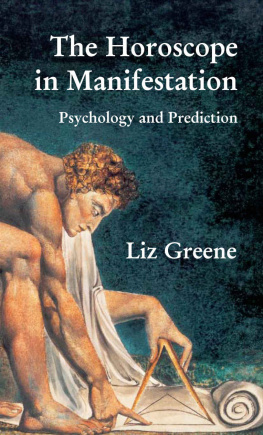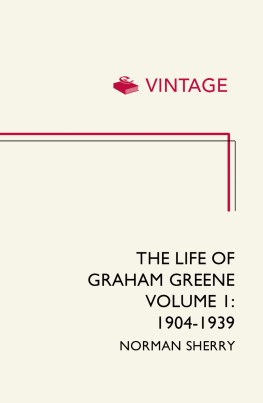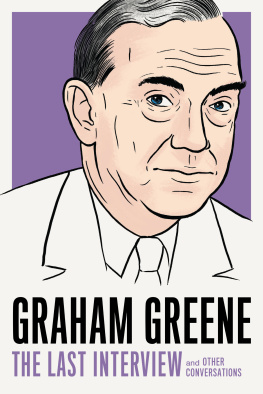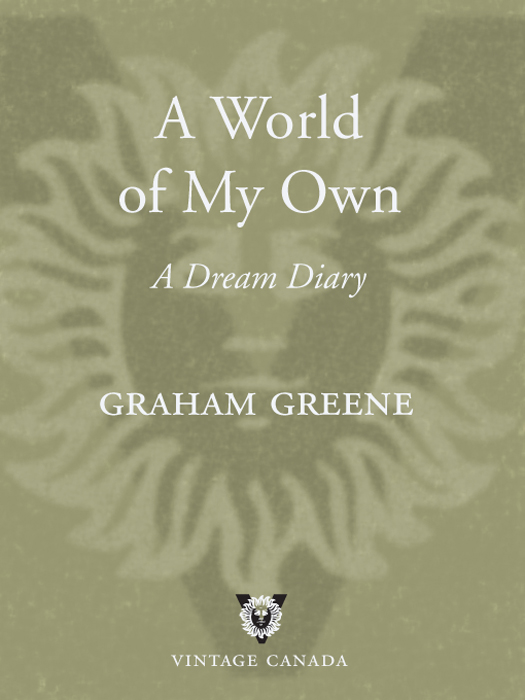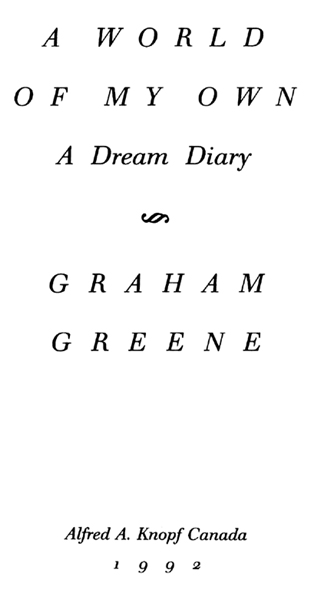BY THE SAME AUTHOR
NOVELS
The Man Within Stamboul Train Its a Battlefield
England Made Me A Gun for Sale Brighton Rock
The Confidential Agent The Power and the Glory
The Ministry of Fear The Heart of the Matter
The Third Man The End of the Affair Loser Takes All
The Quiet American Our Man in Havana A Burnt-Out Case
The Comedians Travels with My Aunt
The Honorary Consul The Human Factor
Doctor Fischer of Geneva or The Bomb Party
Monsignor Quixote The Tenth Man
The Captain and the Enemy
SHORT STORIES
Collected Stories (including Twenty-One Stories,
A Sense of Reality, and May We Borrow Your Husband?)
The Last Word and other stories
TRAVEL
Journey Without Maps The Lawless Roads
In Search of a Character Getting to Know the General
ESSAYS
Collected Essays The Pleasure Dome British Dramatists
Jaccuse Reflections Yours etc.
PLAYS
The Living Room The Potting Shed The Complaisant Lover
Carving a Statue The Return of A. J. Raffles The Great Jowett
Yes and No For Whom the Bell Chimes
AUTOBIOGRAPHY
A Sort of Life Ways of Escape
BIOGRAPHY
Lord Rochesters Monkey An Impossible Woman
CHILDRENS BOOKS
The Little Train The Little Horse-Bus
The Little Steamroller The Little Fire Engine
PUBLISHED BY ALFRED A. KNOPF CANADA
Copyright 1992 Verdant S.A.
Foreword copyright 1992 Yvonne Cloetta
All rights reserved under International Copyright Conventions
Distributed by Random House of Canada Limited, Toronto
Published simultaneously by Reinhardt Books in Great Britain
Canadian Cataloguing in Publication Data
Greene, Graham, 19041991
A world of my own
eISBN: 978-0-307-36377-0
I. Title.
PR 6013. R 44 W 67 1992 823.912 C 92-093990-2
v3.1
According to the expressed wish of the author, this book is published in Britain by his great friend and publisher for many years Max Reinhardt, and in Canada by his niece and publisher Louise Dennys. YC
Foreword
A few days before he died, when his daughter, Caroline, and I were with him at LHpital de la Providence in Vevey, Graham Greene asked me to prepare this dream diary for publication. Only a strong desire to keep a promise made to him induces me, therefore, to write a modest foreword to this posthumous book he entitled A World of My Own.
Graham guarded his privacy as fiercely as he respected the privacy of others. He always refused to write an autobiographyafter he had closed the record at the age of about twenty-seven with A Sort of Lifebecause, as he said, it would have inevitably involved incursions into the privacy of other peoples lives. The private world of his dreams, however, was one that he nurtured carefully, recording it almost daily in the dream diaries that he kept over the last twenty-five years.
From those several volumes, he made this small selection for public reading, choosing carefully and deliberately. The project engaged him in the last months of his life. It interested him. And one of the pleasures of this book is the pleasure that he himself clearly took in making the selection.
In this world of the subconscious and the imaginationa world farfelu as he used to call itwhere everything intersects and gets tangled up beyond time, Graham obviously feels at ease and happy. In a sense it is an autobiography, he says in his Introduction; and its true that between the secret world of dreams and the real world he lived in the divide is narrow. And the barriers have been lifted. Here he can gossip about others, or give free rein to his eagerness for adventure or his delight in the absurd. Dreaming was like taking a holiday from himself. As he confided to a friend: If one can remember an entire dream, the result is a sense of entertainment sufficiently marked to give one the illusion of being catapulted into a different world. One finds oneself remote from ones conscious preoccupations.
I told him once that I was astonished by the clarity with which he remembered his dreams, the preciseness of detail he retained. He explained that the habit of remembering went back to the time he first kept a dream diarywhen, as a boy, he underwent psychoanalysis and was required by his analyst to retell his dreams (sometimes with embarrassing resultsas when he had to confess to an erotic dream about his analysts beautiful wife). Later, when he again began to keep a dream diary, he always had a pencil and paper at hand on his bedside table so that when he awoke from a dream, which happened on average four or five times a night, he could jot down key words that in the morning would allow him to reconstruct it. He would then transcribe it into his diary. I remember the very first diary that he hada large notebook of dark green leather, given to him by friends. Another was the colour of Bordeaux wine.
It is well known that Graham was always very interested in dreams, and that he relied a great deal on the role played by the subconscious in writing. He would sit down to work straightway after breakfast, writing until he had five hundred words (which in the last while he reduced to approximately two hundred). He was in the habit of then rereading, every evening before going to bed, the section of the novel or story he had written in the morning, leaving his subconscious to work during the night. Some dreams enabled him to overcome a blockage; others provided him on occasion with material for short stories or even an idea for a new novel (as with Itsa Battlefield, and The Honorary Consul). Sometimes, as he wrote, identification with a character goes so far that one may dream his dream and not ones ownas happened during the writing of A Burnt-Out Case, so that he was able to attribute his own dream to his character Querry and so extricate himself from an impasse in the narrative.
The most startling aspect of his dreams was their warning nature. One day, I remember, he appeared looking terribly upset. When I enquired after the reason for that distress, he replied: I dreamt of a catastrophe. I hope nothing has happened to one of my family or a close friend. A few hours later we heard on the radio that a plane had crashed into the sea between Corsica and Nice, only a few miles away from his flat in Antibes, killing, I believe, all on board. One of the passengers on the flight was General Cogny, whom Graham knew well from his days in Vietnam.
Examples of that kind are numerous. Visions of panic and distress, visions of happinessthe impressions left in his mind by a dream were so vivid, so clear in every detail, that they would sometimes pursue him and influence his mood for hours after he awakened.
Today, remembering, I cant help thinking about a persistent dream of his which, like a kind of riddle, now seems to have sheltered a personal message. In A Sort of Life he refers to a series of dreams which recurred over the years after the death of his father in 1943, and he writes: In them my father was always shut away in hospital out of touch with his wife and childrenthough sometimes he returned home on a visit, a silent solitary man, not really cured, who would have to go back again into exile. The dreams remain vivid even today, so that sometimes it is an effort for me to realize that there was no hospital, no separation and that he lived with my mother till he died. His unhappiness at these frequent returns to the hospital is perhaps just coincidence, but it is difficult not to see in the dreams a premonition of what he himself would have to endure, nearly half a century later, at the end of his lifehis own enforced exiles in hospital, which he suffered from so much.







